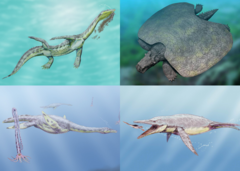
Back Sauropterygia Afrikaans Sauropterygia AN عظائيات زعنفية Arabic عظائيات زعنفيه ARZ Заўраптэрыгіі Byelorussian Sauropterigis Catalan Sauropterygia Czech Sauropterygia German Saŭropterigoj Esperanto Sauropterygia Spanish
| Sauropterygians Temporal range: Early Triassic - Late Cretaceous,
| |
|---|---|

| |
| Sauropterygia diversity. Clockwise from top left: Ceresiosaurus calcagnii (Nothosauroidea), Henodus chelyops (Placodontia), Brachauchenius lucasi, Aristonectes parvidens (Plesiosauria). | |
| Scientific classification | |
| Domain: | Eukaryota |
| Kingdom: | Animalia |
| Phylum: | Chordata |
| Class: | Reptilia |
| Clade: | Neodiapsida |
| Superorder: | †Sauropterygia Owen, 1860 |
| Subgroups | |
| |
Sauropterygia ("lizard flippers") is an extinct taxon of diverse, aquatic reptiles that developed from terrestrial ancestors soon after the end-Permian extinction and flourished during the Triassic before all except for the Plesiosauria became extinct at the end of that period. The plesiosaurs would continue to diversify until the end of the Mesozoic. Sauropterygians are united by a radical adaptation of their pectoral girdle, adapted to support powerful flipper strokes. Some later sauropterygians, such as the pliosaurs, developed a similar mechanism in their pelvis. It is possible that sauropterygians are a distant relatives of turtles, uniting them under the group Pantestudines, although this is still debatable as sauropterygians might be archosauromorphs or completely unrelated to both.